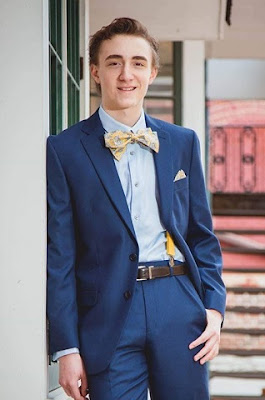Then we shift focus to three mismatched kids, who for some reason are left behind during a camping trip:
1. Alex (Jack Gore), a socially awkward video game addict with a smothering helicopter mother.
2. ZhengZheng (Miya Cech) from China, who conned her way into the camp for reasons that are never explained, and who doesn't speak. Until she does. Her reasons for pretending to be mute are never explained, either.
3. The bling-wearing, girl-crazy, ultra-rich Dariush (Benjamin Flores Jr.), who lives in a mansion with his ultra-rich father and his trophy wife. With all that excess, one expects Dad to be a famous actor or musician, but actually he owns a car dealership. Several statements make it clear that Dariush is scripted as Persian, but the actor is black.
Suddenly there are explosions in the air, a "mandatory evacuation" text appears on their cell phones, and this becomes an alien invasion movie. They return to camp to find it deserted. And a fourth kid appears:
4. The mysterious Gabriel (Alessio Scalzotto), who won't say where he came from and doesn't know some of the basics of modern society, like how to read numbers. I thought he was either an alien in disguise or the actual angel Gabriel, but his secret is much, much more banal.
Aliens attack the deserted camp. One of them has a dog, which results in a Jurassic Park raptor-in-the-kitchen scene.
Another extrudes a long tube from its head into Dariush's mouth and deposits something. We expect that Dariush will develop super powers, or turn into a half-alien hybrid, or something, but nothing comes of it.
The kids find a key that can be used to destroy the alien mother ship, and have to cross 40 miles of deserted, destroyed Los Angeles to the Pasadena Space Center to use it (that's right, the entire greater L.A. area was evacuated in a few hours).
On the way, with no prior warning, Alex and ZhengZheng fall in love. They hold hands; they spend the night cuddling; they kiss to lush triumphant music. The closing montage that shows the kids being lauded for saving the world includes a prom picture.
Equally without warning, the sparring Gabriel and Dariush fall in love. They hug; they almost hold hands; they spend the night spooning. But just as we think that they're going to become a canonical gay couple, they break away, and spend the closing montage on opposite sides of Alex and ZhengZheng.
So are they a couple or not?
The spooning scene is worth the price of admission, but they could have been much more open.
Just another one of the missed opportunities in this movie.
Beefcake: The counselor with the chest appears for about a second.
My grade: D
























